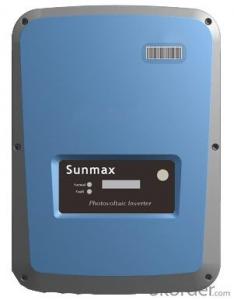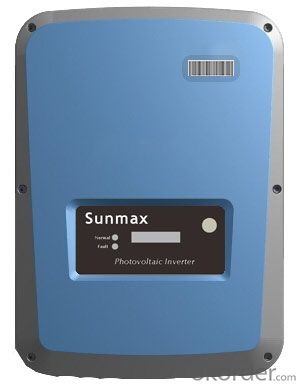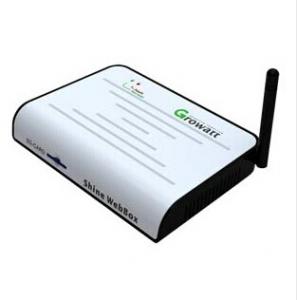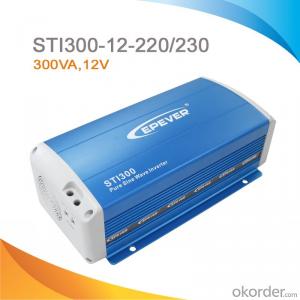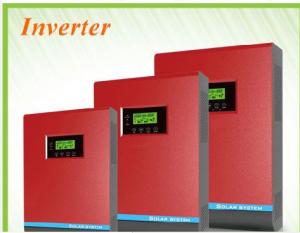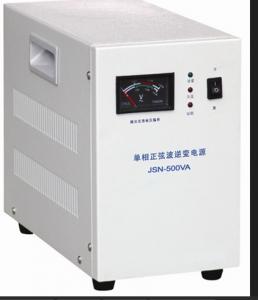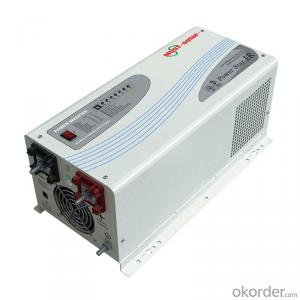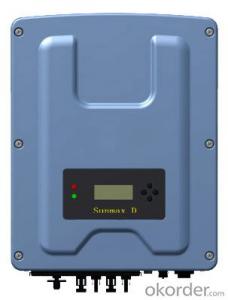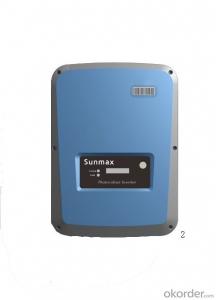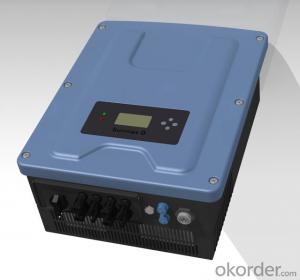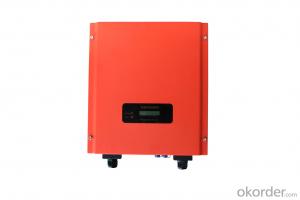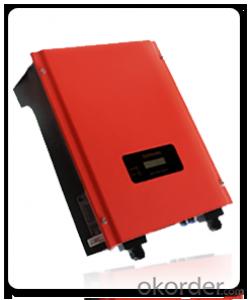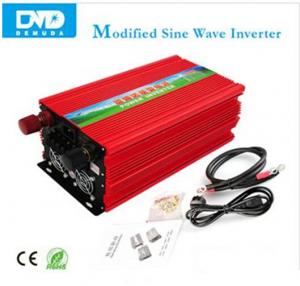3kW Solar Inverter - Sunmax PV Inverter 1500/2500/3600/4600
- Loading Port:
- Shanghai
- Payment Terms:
- TT OR LC
- Min Order Qty:
- 5 watt
- Supply Capability:
- 3000 watt/month
OKorder Service Pledge
OKorder Financial Service
You Might Also Like
Product Details
Sunmax 1500/2500/3600/4600 series are string type solar inverters for home grid connected solar generation systems. The Sunmax 1.5-5Kw series products are both reliable and good looking, have excellent technical characteristics and can be installed either indoors or outdoors.
High Efficiency:
The maximum efficiency of the inverter is up to 97.6%.
Single MPPT
Transfomer-less design
Wide range of MPPT voltage
Safe:
The units have built-in leakage current monitoring devices.
Units use thin-film capacitors ensuring better product performance.
IP65 protection class
Optional DC switch
Flexible:
Indoor and outdoor installation option
Multilingual LCD display for the user to select
Hanging design makes installation easy.
RS485 integrated interface and the Bluetooth communication module makes the units convenient for monitoring
- Q: How is the efficiency of a solar inverter measured?
- The efficiency of a solar inverter is typically measured by dividing the output power of the inverter by the input power, and then multiplying the result by 100 to get a percentage value.
- Q: How does a solar inverter handle harmonic distortion?
- A solar inverter handles harmonic distortion by incorporating filters and control algorithms that help mitigate and minimize harmonics in the system. These filters are designed to reduce harmonic current injection into the grid, ensuring compliance with power quality standards. Additionally, advanced control algorithms continuously monitor the inverter's output waveform and adjust its operation to reduce harmonic distortion and maintain clean power generation from the solar panels.
- Q: How does a solar inverter work?
- A solar inverter works by converting the direct current (DC) electricity produced by solar panels into alternating current (AC) electricity that can be used to power household appliances and be connected to the electric grid. It also ensures that the solar panels operate at their maximum efficiency by tracking the maximum power point and optimizing the power output.
- Q: Can a solar inverter be used in areas with high temperature fluctuations?
- Yes, solar inverters can typically be used in areas with high temperature fluctuations. Most modern solar inverters are designed to operate within a wide temperature range, allowing them to function properly even in environments with significant temperature variations. However, it is always important to consider the specific temperature range mentioned in the inverter's specifications to ensure optimal performance and longevity.
- Q: What is the role of a solar inverter in a solar power system?
- The role of a solar inverter in a solar power system is to convert the direct current (DC) electricity generated by the solar panels into alternating current (AC) electricity that can be used to power appliances and devices in homes or businesses. It also regulates and optimizes the flow of electricity to ensure maximum efficiency and safety in the solar power system.
- Q: What is the role of a grid protection relay in a solar inverter?
- The role of a grid protection relay in a solar inverter is to monitor the electrical grid and protect against any abnormalities or faults that may occur. It ensures the safe and reliable operation of the solar inverter by detecting and isolating faults such as overvoltage, undervoltage, overfrequency, underfrequency, and other grid disturbances. The grid protection relay acts as a safeguard, preventing any damage to the solar inverter and maintaining the stability of the grid connection.
- Q: Can a solar inverter be used with solar-powered water purification systems?
- Yes, a solar inverter can be used with solar-powered water purification systems. A solar inverter is responsible for converting the direct current (DC) produced by solar panels into alternating current (AC) for powering electrical devices. In the case of solar-powered water purification systems, the solar panels generate electricity, which is then converted by the inverter to power the system's pumps, filters, and other components required for water purification.
- Q: How does a solar inverter handle voltage unbalance?
- A solar inverter handles voltage unbalance by continuously monitoring the grid voltage levels and adjusting its output accordingly. If it detects any voltage imbalance, it dynamically regulates the output voltage to balance the system. This ensures that the inverter operates within the acceptable voltage limits, prevents damage to the connected devices, and maintains efficient energy conversion.
- Q: Can a solar inverter be used with a solar-powered waste management system?
- Yes, a solar inverter can be used with a solar-powered waste management system. A solar inverter is responsible for converting the direct current (DC) produced by solar panels into alternating current (AC) that can be used to power various appliances and systems. In the case of a solar-powered waste management system, the solar inverter would ensure that the electricity generated by the solar panels is compatible with the system's components, such as motors, sensors, and controls. This would enable the waste management system to operate efficiently using clean and renewable solar energy.
- Q: Can a solar inverter be used with solar-powered data centers?
- Yes, a solar inverter can be used with solar-powered data centers. A solar inverter is the device that converts the direct current (DC) generated by solar panels into alternating current (AC) electricity that can be used to power electrical devices. By connecting a solar inverter to a solar-powered data center, the generated solar energy can be efficiently utilized to power the data center's electrical infrastructure and equipment. This helps reduce the reliance on traditional energy sources and promotes sustainability in data center operations.
Send your message to us
3kW Solar Inverter - Sunmax PV Inverter 1500/2500/3600/4600
- Loading Port:
- Shanghai
- Payment Terms:
- TT OR LC
- Min Order Qty:
- 5 watt
- Supply Capability:
- 3000 watt/month
OKorder Service Pledge
OKorder Financial Service
Similar products
Hot products
Hot Searches
Related keywords
